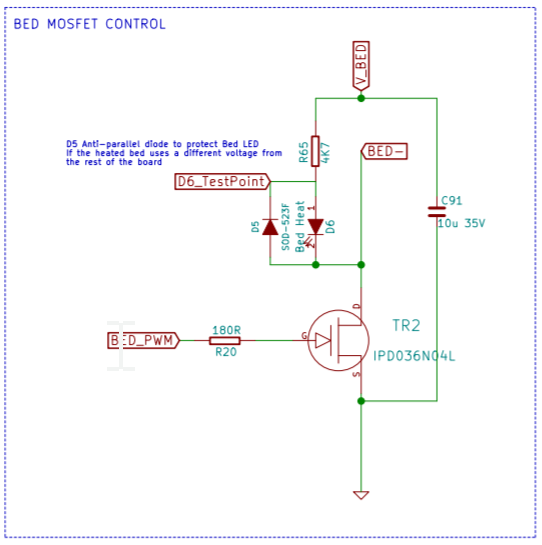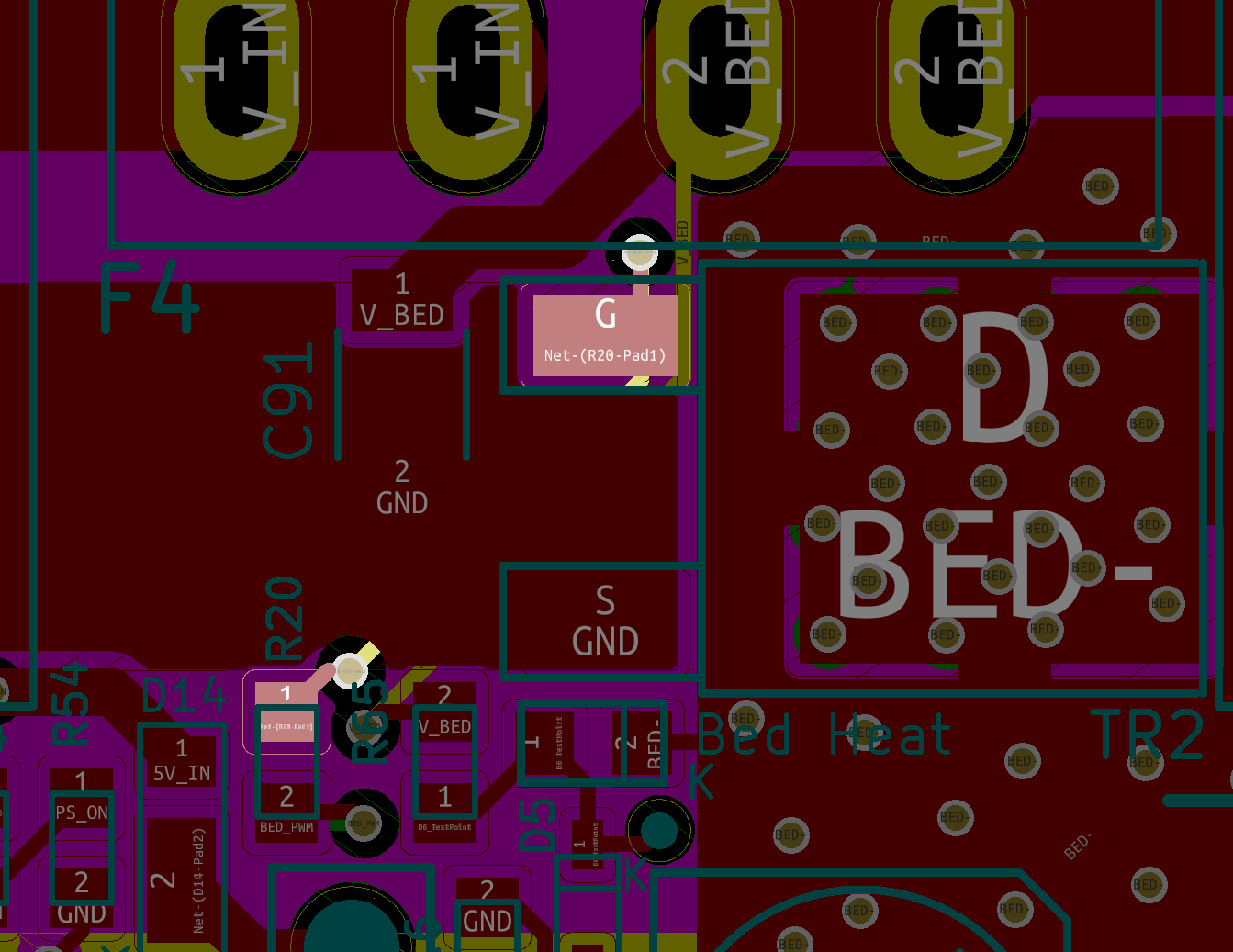Duet Maestro Bed heating uncontrolled
-
@bearer said in Duet Maestro Bed heating uncontrolled:
we also don't know if M3D changed the default bed fuse to match their chosen bed.
I see no evidence any fuse related to the bed.
-
@NTX9 said in Duet Maestro Bed heating uncontrolled:
@bearer said in Duet Maestro Bed heating uncontrolled:
we also don't know if M3D changed the default bed fuse to match their chosen bed.
I see no evidence any fuse related to the bed.
The Duet WiFi/Ethernet has a bed fuse, the Duet Maestro doesn't.
-
@droftarts said in Duet Maestro Bed heating uncontrolled:
... Or would you need to heat the bed to 200C first, as it's a massive heatsink?
The best (/only) way I have found so far is the smallest ring on my gas hob on low and a gas soldering iron. Perhaps not brilliant but so far not warped them and soldered on silicone insulated 14AWG wire.
That said if the hotbed has had anything else on it the fumes could be nasty.
-
So bypassing the on board mosfet has proven to be more of a soldering challenge than I anticipated. My feeble skill has basically rendered surface solder pad for the mosfet gate unusable.
Is it possible to edit the firmware to use E1 to control an external mosfet? Or is there a pin on the expansion header that I can connect to that is upstream from the bed mosfet?
-
@NTX9 said in Duet Maestro Bed heating uncontrolled:
Is it possible to edit the firmware to use E1 to control an external mosfet?
Should be able to configure that. What firmware version are you running? If you're using RRF3 you can define a different pin.
https://duet3d.dozuki.com/Wiki/Gcode#Section_M307_Set_or_report_heating_process_parameters
If you're using RRF2 check out M140 H1 https://duet3d.dozuki.com/Wiki/Gcode#Section_M140_Set_Bed_Temperature_Fast
-
No header, but if you cannot use @Phaedrux suggestion you could attempt soldering to the gate resistor instead.
If you can preheat the whole board it will ease the soldering job. Pretty much any means that will get you closer to the general reccomendation will work, although I'd avoid direct flame, sand in a skillet on a gas hob is a better alternative to direct flame. Hairdryer, a printers heat bed or whatever you have.
Target topside temperatures should fall between 95 and 105°C across the assembly and reach that point no faster than 1 to 5°C per second.
-
@bearer
OK so now I am really confused.
I am seeing 24 volts at R65, D6 and D5 immediately on powering the board.
Now I am not even sure if the mosfet was damaged or if something is going on upstream.
-
@NTX9 said in Duet Maestro Bed heating uncontrolled:
I am seeing 24 volts at R65, D6 and D5 immediately on powering the board.
if you look at the schematic and realize V_BED is 24v then it might make more sense?
in any case the gate resistor is R20 as highlighted on the pcb screenshot, if you want to go digging you'll find all the files on github
https://github.com/T3P3/Duet/tree/master/Duet2/Duet2v1.04 -
@bearer
The voltage is showing up even when the bed temp is set to zero?
-
@NTX9 said in Duet Maestro Bed heating uncontrolled:
@bearer
The voltage is showing up even when the bed temp is set to zero?
V_BED doesn't change unless you pull the fuse, with no current flowing there will be no voltage drop and all voltages will for those parts will be Vin essentially; but its irrelevant to using the gate signal from R20.
-
@bearer said in Duet Maestro Bed heating uncontrolled:
in any case the gate resistor is R20 as highlighted on the pcb screenshot, if you want to go digging you'll find all the files on github
https://github.com/T3P3/Duet/tree/master/Duet2/Duet2v1.04Thanks !
-
@bearer said in Duet Maestro Bed heating uncontrolled:
@NTX9 said in Duet Maestro Bed heating uncontrolled:
@bearer
The voltage is showing up even when the bed temp is set to zero?
V_BED doesn't change unless you pull the fuse, with no current flowing there will be no voltage drop and all voltages will for those parts will be Vin essentially; but its irrelevant to using the gate signal from R20.
Thanks again, now I see that the bed PWM feeds through R20 to the mosfet gate. I am a little slow but starting to get how this thing works.
-
@Phaedrux said in Duet Maestro Bed heating uncontrolled:
@NTX9 said in Duet Maestro Bed heating uncontrolled:
Is it possible to edit the firmware to use E1 to control an external mosfet?
Should be able to configure that. What firmware version are you running? If you're using RRF3 you can define a different pin.
https://duet3d.dozuki.com/Wiki/Gcode#Section_M307_Set_or_report_heating_process_parameters
If you're using RRF2 check out M140 H1 https://duet3d.dozuki.com/Wiki/Gcode#Section_M140_Set_Bed_Temperature_Fast
This seems like my least painful option. I am on firmware 2.03.
Thanks It may be a few days but I will get back once I have time to try this.
-
@NTX9 I said M140 H1, but the H# will depend on where you have the extruder. May be H2 for you.
May be a good idea to update to 2.05.1 as well for all the bug fixes etc.
-
@Phaedrux said in Duet Maestro Bed heating uncontrolled:
@NTX9 I said M140 H1, but the H# will depend on where you have the extruder. May be H2 for you.
May be a good idea to update to 2.05.1 as well for all the bug fixes etc.
My E1 heater port is open on the board. Is that H1 in the firmware?
-
No, in RRF2 H0 is the bed heater port, H1 is the E0 heater port, and H2 is the E1 heater port.
-
@Phaedrux said in Duet Maestro Bed heating uncontrolled:
No, in RRF2 H0 is the bed heater port, H1 is the E0 heater port, and H2 is the E1 heater port.
Ha I am glad I asked...

